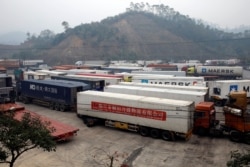Vietnam’s leadership this year of a Southeast Asian negotiating bloc has opened a door to bolster its defense against longtime rival China through stronger relations with the West, experts say.
The Quadrilateral Security Dialogue, or Quad, a U.S.-led grouping that also includes Australia, India and Japan, invited Vietnam to join talks on COVID-19 and economic impacts in March, and its members have conferred with Vietnamese officials regularly since then.
U.S. Secretary of State Michael Pompeo finished his five-nation Asia visit with a stop in Vietnam Friday. He praised the host country’s “sovereignty” when he met Friday with Foreign Minister Pham Binh Minh in Hanoi and said he looked forward to further improvement in relations.
Vietnam is this year’s chair of the 10-member Association of Southeast Asian Nations, giving it exposure that scholars believe was key for Quad interest? Vietnam stood out in the ASEAN chair role, which rotates every year, by bringing together heads of state and their ministers for tough discussions online, not in person as they prefer, because of the COVID-19 pandemic.
Unlike other Southeast Asian countries that resent China’s maritime expansion, Vietnam has been outspoken about its views. That resistance endears Vietnam to Western allies despite its communist government and a protracted war with the United States.
“Vietnam was invited because Vietnam was one of the bulwarks against China, but they can camouflage that [as] Vietnam was invited because Vietnam is the chair of ASEAN,” said Alexander Vuving, professor at the Daniel K. Inouye Asia-Pacific Center for Security Studies in Hawaii.
Vietnam’s engagement with the Quad marks a stride forward in its broader global visibility that has already grown with a two-year stint on the U.N. Security Council and strategic alliances with Japan and India, said Carl Thayer, an emeritus professor at the University of New South Wales in Australia who specializes in Southeast Asia.
“Getting in the Quad is part of that broader strategy of getting yourself involved in as many multinational organizations [as possible] and contribute positively but for your own benefit to win friends all across the board,” Thayer said.
Vietnam wants powerful friends as backup in any talks or movement to fend off Beijing’s expansion in the 3.5 million-square-kilometer, resource-rich South China Sea, scholars believe.
The two sides periodically ram each other’s boats and try to keep each other away from undersea energy reserves — as China uses technological and military advantages to occupy tiny islets.
The two communist neighbors often make up after these incidents but never settle them. They had already sparred on and off for centuries over territory, culminating in a war in the 1970s.
Quad connections “will give Vietnam a solid regional ‘coalition’ to work on China with,” said Yun Sun, East Asia Program senior associate at the Stimson Center in Washington.
“For a Vietnam that has been resisting China alone for centuries, to have those solid partners will improve Vietnam’s leverage and position,” she said.
The Quad was launched 13 years ago. It’s seen as a counterweight to Chinese expansion, from the Sino-Indian border to the South China Sea. New Zealand and South Korea joined Vietnam for Quad talks this year about COVID-19.
China will “think the worst” of Vietnam’s Quad role, Thayer said.
Vietnam has hardly forgotten ASEAN or forsaken China, though. As ASEAN readies for a leadership summit November 11-15, Vietnam has a chance to help the members clinch a free-trade agreement involving China. China is already an economic benefactor for much of Southeast Asia, and Vietnam counted China last year as its No. 2 trading partner, after the United States.
A breakthrough this year in the Regional Comprehensive Economic Partnership deal after nine years of discussion would make Vietnam “look good” by helping so many economies, said Rajiv Biswas, senior regional economist with IHS Markit, a London-based market analysis firm. The 15 would-be partnership countries make up almost 30% of the global gross domestic product.
“Because these things have been under conversation for quite a few years, if they can pull it off under their chairmanship then it looks good that they were the ones who were able to bring it over the line,” Biswas said.











